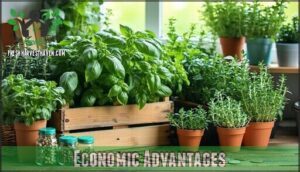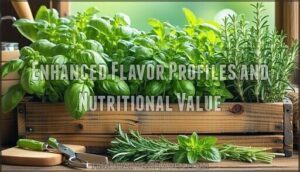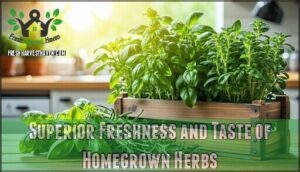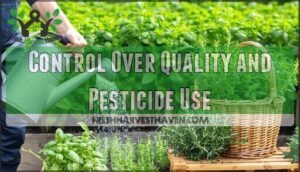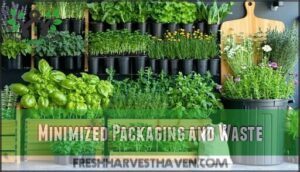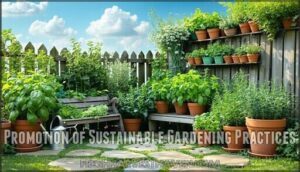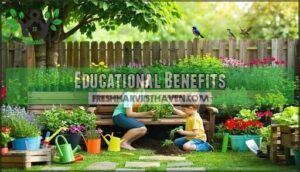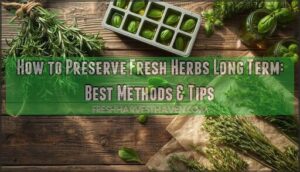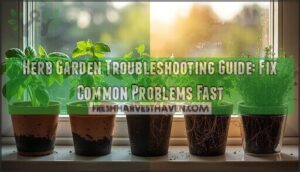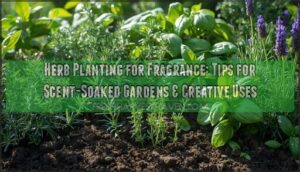This site is supported by our readers. We may earn a commission, at no cost to you, if you purchase through links.
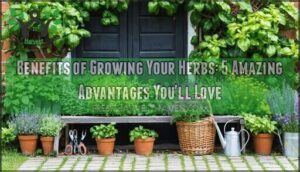
You’ll save money since a single basil plant produces what costs $20+ in store-bought packages, while enjoying superior flavor that makes your cooking shine.
The physical activity of tending herbs reduces stress and connects you with nature, creating a therapeutic routine that improves both mental and physical well-being.
You’ll control quality without pesticides, reduce packaging waste, and gain access to exotic varieties unavailable in stores.
Plus, there’s something deeply satisfying about snipping fresh oregano for tonight’s pasta sauce, and the rewards multiply once you discover how these simple plants revolutionize your health, wallet, and culinary adventures.
Table Of Contents
- Key Takeaways
- Health Benefits Found
- Economic Advantages
- Culinary Enhancements
- Environmental Benefits
- Educational Benefits
- Frequently Asked Questions (FAQs)
- Is it worth growing your own herbs?
- What are the benefits of herb gardening?
- Why are herbs so powerful?
- What is the healthiest herb to grow?
- What are the benefits of growing your own herbs?
- Is it okay to eat herbs daily?
- Why are herbs so important?
- What are the advantages of a home herb garden?
- Are herbs good for You?
- Should you grow your own herbs?
- Conclusion
Key Takeaways
- You’ll save significant money – A single basil plant produces what costs $20+ in store-bought packages, while seed packets cost just $2.50 and provide harvests for months.
- You’ll enjoy superior flavor and nutrition – Fresh herbs harvested moments before use retain peak vitamins, essential oils, and antioxidants that store-bought varieties lose during transport and storage.
- You’ll reduce your environmental impact – Growing herbs eliminates packaging waste, transportation emissions, and pesticide use while supporting local ecosystems and biodiversity.
- You’ll gain therapeutic benefits and life skills – Herb gardening reduces stress, provides gentle physical activity, teaches patience and perseverance, and creates opportunities for family bonding and community connections.
Health Benefits Found
You’ll discover that growing herbs isn’t just about cooking – it’s about transforming your health in ways you mightn’t expect.
Growing herbs transforms your entire wellness journey, not just your next meal.
From reducing stress through gentle gardening activities to boosting your immune system with fresh medicinal plants, herb gardening offers surprising wellness benefits that extend far beyond the kitchen, including reducing stress and boosting your health with medicinal plants.
Physical Activity and Stress Reduction
Rolling up your sleeves for a little gardening exercise does wonders for your mental wellbeing. You’ll get nature exposure, mood enhancement, and a sensory experience like no other.
Here’s what you gain:
- Stress relief through hands-on work.
- Boosted mental health from fresh air.
- Mindfulness while tending fresh herbs.
- Daily movement—no gym membership required!
In addition, gardening organically can provide increased vitamin content in your homegrown herbs, which is a great way to achieve daily movement.
Improved Skin Health and Immune System Support
Your homegrown herbs pack powerful health benefits that go beyond the kitchen.
Fresh herbs like oregano and peppermint contain potent herbal antioxidants that boost your immune system while supporting skin health.
These natural immune boosters help your body fight off infections more effectively.
| Herb | Skin Health Benefits | Immune Support Properties |
|---|---|---|
| Oregano | Anti-inflammatory herbs reduce skin irritation | High antioxidant properties strengthen defenses |
| Peppermint | Cooling effect promotes skin hydration | Natural antimicrobial compounds fight pathogens |
| Rosemary | Stimulates circulation for healthier complexion | Rosmarinic acid provides immune support |
| Thyme | Antimicrobial properties aid wound healing | Thymol compound enhances immune function |
These health benefits become readily available when you grow your own supply at home.
Medicinal Herbs and Their Uses
Beyond supporting your immune system, specific medicinal herbs offer targeted healing for common ailments.
You’ll discover that herbal remedies provide natural healing alternatives when you understand proper dosage guidelines and herb interactions.
Here are 5 powerful medicinal herbs you can grow:
- Echinacea – Boosts immune function and shortens cold duration with consistent use
- Turmeric – Contains curcumin for anti-inflammatory benefits and antioxidant protection
- Ginger – Alleviates nausea effectively while supporting healthy digestion naturally
- Peppermint – Relieves headaches and soothes digestive discomfort when needed
- Aloe vera – Heals skin topically with anti-inflammatory compounds for faster recovery
These herb benefits make herbal medicine accessible right from your garden, giving you natural remedies for specific health concerns.
You can find a variety of Echinacea cold remedies online.
Social Benefits of Sharing Homegrown Herbs
Growing herbs creates opportunities for community building through herb exchanges and sharing surplus harvests with neighbors.
You’ll discover that fostering generosity through fresh basil or mint strengthens neighborhood connections while building a supportive gardening community.
These shared knowledge moments and gardening resources exchanges transform your hobby into meaningful social bonds within community gardens, and help create a sense of neighborhood connections.
Economic Advantages
You’ll discover that growing herbs offers impressive financial benefits that extend far beyond the initial investment.
The economic advantages include substantial long-term savings, low startup costs with quick returns, and the ability to share your abundant harvests while reducing food waste, which can lead to financial benefits.
Long-term Cost Savings and Reduced Reliance on Stores
Your herb garden ROI becomes crystal clear when you calculate the numbers. A single basil plant costs $3 but yields $30 worth of fresh herbs throughout the growing season, while seed saving economics let you replant year after year without additional costs.
- Perpetual harvest means one plant provides months of continuous herbs versus $5 store bundles
- Reduce store trips by growing essentials like basil, cilantro, and parsley at home
- Cost savings add up fast – homegrown herbs cost pennies per serving compared to store prices
- Sustainable kitchen practices eliminate weekly herb purchases and packaging waste
- Herb garden investments pay for themselves within the first harvest season
Abundance of Herbs for Sharing and Gifting
Your herb garden produces far more than you’ll ever consume, creating perfect opportunities for herb gifting ideas and sharing surplus herbs with neighbors.
Fresh herbs make thoughtful herb-themed presents that strengthen community bonds while reducing waste.
Consider joining herb exchange programs or starting community herb gardens where everyone benefits from diverse varieties and shared knowledge about herb gardening techniques.
Low Initial Cost and Quick Return on Investment
Starting with just a seed packet cost of $2.50, you’ll discover that growing herbs delivers incredible value from day one.
These easy herbs require minimal fertilizing and thrive in indoor herb gardens, making them perfect for beginners.
Transplant hardiness means you can grow multiple herbs per pot, creating fresh herbs year-round while you save money through impressive cost-efficiency.
You can find various herb seed packet options online, which is a great way to get started with growing herbs.
Sustainable Practice and Reduced Food Waste
With careful planning, you’ll transform kitchen scraps into garden gold while slashing your grocery bills.
Herb composting and seed saving practices create a self-sustaining cycle that reduces waste and supports garden sustainability.
- Harvest only what you need to minimize spoilage
- Compost herb trimmings to enrich soil naturally
- Save seeds from mature plants for future seasons
This eco-friendly cooking approach demonstrates true environmental consciousness while maximizing cost-efficiency.
Culinary Enhancements
You’ll discover that growing your own herbs transforms your cooking with intense flavors and peak nutrition that store-bought herbs simply can’t match.
Fresh herbs from your garden provide complete control over quality while giving you access to exotic varieties that aren’t available in most grocery stores.
Enhanced Flavor Profiles and Nutritional Value
Fresh herbs transform your cooking with Peak Freshness that store-bought varieties can’t match.
When you harvest basil or cilantro moments before use, you’ll capture Superior Nutrition and herb flavors at their strongest.
Vitamin retention stays high, while antioxidant properties remain intact.
This nutritional value boost makes every meal healthier and more flavorful than dried alternatives.
| Fresh vs. Store-Bought | Your Garden Advantage |
|---|---|
| Wilted leaves, lost nutrients | Peak vitamins, vibrant colors |
| Days-old herb aromas | Just-picked fragrance explosion |
| Limited variety, high cost | Flavor Diversity at your fingertips |
| Pesticide concerns | Clean, chemical-free herbs |
Culinary Experimentation becomes exciting when you control harvest timing and quality.
Increased Accessibility to Exotic Herbs
Beyond enhanced flavors, you’ll discover a world of exotic herb varieties impossible to find in regular stores.
Home cultivation opens doors to rare herbs like shiso, lemon verbena, and Thai basil that transform ordinary meals into culinary adventures.
Your garden becomes a global herb sourcing center, eliminating the hunt for specialty ingredients:
- Rare Herb Cultivation – Grow heirloom varieties unavailable commercially
- Seed Availability – Access diverse seeds from specialty suppliers worldwide
- Unique Flavors – Experience authentic tastes from different cultures
- Plant Diversity – Cultivate dozens of herb varieties in small spaces
- Culinary Exploration – Experiment with authentic international recipes.
Herb identification becomes second nature as you nurture these exotic treasures, expanding your culinary horizons far beyond what any grocery store offers.
You can even find a wide variety of exotic herb seeds online.
Superior Freshness and Taste of Homegrown Herbs
You’ll taste the difference immediately when you harvest herbs straight from your garden to table.
Fresh herbs maintain their peak herb flavor and essential oils, delivering superior taste compared to store-bought options that lose potency during transport.
This freshness comparison reveals why homegrown culinary herbs consistently outperform commercial varieties, encouraging culinary experimentation with flavor enhancement that transforms ordinary dishes into extraordinary meals.
Control Over Quality and Pesticide Use
When you grow your own herbs, you control exactly what goes into your plants.
No mysterious pesticide-free labels to decipher—you know your organic herb quality is genuine because you created it yourself.
You’re the master of your own toxin-free produce, using safe herb gardening practices that guarantee herb cleanliness.
This organic gardening approach means your chemical-free herbs are truly natural.
To further guarantee your herbs are safe, consider using diatomaceous earth as a natural pest control method.
Environmental Benefits
When you grow your own herbs, you’re making a smart choice for the planet.
You’ll cut down on transportation emissions and packaging waste while supporting local ecosystems right in your backyard, which is a smart choice.
Reduced Carbon Footprint and Transportation Emissions
Everyone knows that those store-bought herbs travel thousands of miles to reach your plate, burning fossil fuels along the way.
When you establish Local Herb Gardens at home, you’re creating Sustainable Food Systems that dramatically cut transportation emissions.
Your herb garden eliminates the need to Minimize Food Miles, making Eco-Friendly Gardening a simple yet powerful way to shrink your environmental impact and embrace sustainable practices.
Consider composting food scraps to further enrich your garden’s soil.
Minimized Packaging and Waste
Your homegrown herbs come without plastic clamshells, twist ties, or excessive packaging that clutters store-bought varieties.
You’ll reduce packaging waste substantially while embracing zero-waste living through sustainable kitchen practices.
When you compost herbs and trimmings, you’re creating nutrient-rich soil amendments that support eco-friendly herbs.
This waste reduction approach minimizes your environmental impact while promoting sustainable herbs that benefit both your household and planet.
Promotion of Sustainable Gardening Practices
Beyond waste reduction, your herb garden becomes a model of environmental stewardship.
You’ll naturally embrace practices that benefit both your plants and the planet.
Here are five sustainable gardening practices you’ll adopt:
- Water Conservation – Herbs require less irrigation than ornamental plants, reducing your water footprint substantially
- Native Herb Gardens – Growing indigenous varieties like wild mint supports local wildlife while requiring minimal resources
- Composting Herb Trimmings – Transform garden waste into nutrient-rich soil amendments instead of sending clippings to landfills
- Pesticide-Free Herbs – Eliminate chemical inputs that harm beneficial insects and contaminate groundwater systems
- Organic Herbs cultivation – Build healthy soil microbiomes that sequester carbon and improve long-term garden sustainability
Your sustainable living choices create ripple effects throughout your community, inspiring others toward environmental responsibility.
Support for Local Ecosystems and Biodiversity
When you cultivate native herb gardens, you’re creating pollinator habitats that boost local biodiversity by up to 30%.
Your organic herbs attract beneficial insects while reducing pesticides, supporting wildlife naturally.
These sustainable herbs foster environmental stewardship, turning your garden into a biodiversity hotspot that helps preserve native species and strengthens ecosystem health.
Educational Benefits
Growing herbs transforms your backyard into a living classroom where you’ll discover valuable lessons about nature, patience, and sustainability.
You’ll teach children where food comes from while developing your own problem-solving skills and environmental awareness through hands-on gardening experience, fostering sustainability.
Teaching Children About Food Origins and Waste Reduction
Growing herbs creates powerful educational opportunities for children.
Garden-to-table experiences teach kids where food comes from, making abstract concepts tangible. They’ll witness the herb life-cycle firsthand, developing sustainable habits naturally.
- Composting basics – Turn herb trimmings into nutrient-rich soil
- Seed saving – Collect seeds for next season’s garden
- Reducing waste – Harvest only what you need
- Life lessons – Learn patience through plant growth cycles
These educational opportunities transform family time into meaningful learning experiences about environmental responsibility.
Promoting Healthy Eating and Environmental Awareness
When you teach kids about herb gardening, you’re planting seeds of Nutritional Education and environmental consciousness.
Your herb garden becomes a living classroom where children discover how Sustainable Diets connect to their daily meals and environmental conservation practices.
| Learning Focus | Garden Activity | Real-World Impact |
|---|---|---|
| Conscious Consumption | Track herb usage vs. waste | Reduce Foodprint through mindful harvesting |
| Sustainable Agriculture | Compare organic vs. conventional methods | Understanding chemical-free growing practices |
| Community Gardens | Share surplus herbs with neighbors | Building environmental awareness through giving |
Growing herbs transforms abstract concepts into tangible experiences.
Kids see firsthand how sustainable agriculture works when they witness pesticide-free plants thriving.
This hands-on approach to environmental conservation creates lasting impressions about health benefits and responsible food choices.
Opportunities for Social Connection and Community Building
Your herb garden creates a natural meeting ground where neighbors discover shared interests and build lasting friendships.
Sharing surplus herbs with friends breaks down barriers and strengthens community bonds through simple acts of generosity.
- Community Gardens: Join local gardening clubs to exchange growing tips and participate in neighborhood herb swaps
- Social Connections: Host informal gatherings where neighbors share recipes and discuss their favorite herb varieties
- Local Events: Organize herb-themed potlucks that bring people together through shared gardening experiences
Developing Patience, Perseverance, and Life Skills
Watching your herbs grow from tiny seeds teaches you that good things take time.
This gardening patience builds character as you learn to water consistently, even when progress seems slow.
Each day caring for your plants develops persistence and shows how effort rewards you with fresh flavors.
Home gardens boost biodiversity by creating safe havens for bees.
These life skills transfer beyond the garden, creating opportunities for family bonding and sustainable appreciation.
Frequently Asked Questions (FAQs)
Is it worth growing your own herbs?
Planting your own herb garden is like striking gold in your backyard.
You’ll save money, enjoy fresher flavors, and gain convenient access to pesticide-free ingredients that enhance your cooking while supporting better health.
What are the benefits of herb gardening?
You’ll discover herb gardening saves money, provides fresher flavors, and reduces stress while encouraging healthy eating habits. Growing herbs connects you with nature’s cycles and builds practical skills.
Why are herbs so powerful?
You’re tapping into nature’s medicine cabinet when you grow herbs – they’re packed with concentrated antioxidants, essential oils, and bioactive compounds that fight inflammation, boost immunity, and support healing naturally.
What is the healthiest herb to grow?
Cilantro stands out as the healthiest herb you can grow, packed with antioxidants, vitamin K, and natural detoxifying compounds.
You’ll get fresh harvests year-round while supporting your immune system and digestive health naturally.
What are the benefits of growing your own herbs?
Don’t put all your eggs in one basket—diversify your culinary arsenal! You’ll save money, enjoy fresher flavors, and gain convenient access to pesticide-free herbs year-round.
Is it okay to eat herbs daily?
Yes, you can safely eat herbs daily.
Most culinary herbs like basil, oregano, and parsley contain beneficial antioxidants and vitamins that support your health when consumed regularly as part of a balanced diet.
Why are herbs so important?
Herbs boost your health, enhance your meals, and save you money. They’re packed with antioxidants, vitamins, and compounds that fight inflammation, support digestion, and may prevent chronic diseases.
What are the advantages of a home herb garden?
You’ll save money, enjoy fresher flavors, and gain convenient access to pesticide-free herbs year-round.
Home gardens provide superior taste, reduce grocery trips, and offer therapeutic benefits while encouraging healthier cooking habits.
Are herbs good for You?
You’ll get powerful antioxidants, vitamins A, C, and K from fresh herbs like basil and cilantro. They boost immunity, aid digestion, and contain anti-inflammatory compounds that help prevent chronic diseases.
Should you grow your own herbs?
A $50 seed packet can save you hundreds annually on herbs. You’ll enjoy fresher flavors, better nutrition, and pesticide-free control while reducing grocery trips and plastic packaging waste from your kitchen.
Conclusion
Embracing the gentle art of botanical cultivation brings remarkable rewards to your daily routine.
The benefits of growing your herbs extend far beyond simple gardening, creating a sustainable cycle that nourishes your body, wallet, and environment.
You’ll discover therapeutic relaxation through soil work, enhanced immunity from fresh nutrients, and significant cost savings over time.
Your kitchen transforms with exotic flavors unavailable in stores, while reduced packaging waste supports environmental health.
Children learn valuable lessons about food origins and patience through hands-on herb cultivation experiences.
- https://www.thecharlottepost.com/news/2021/11/01/health/herb-garden-reconnects-community-with-plants-health-benefits/
- https://publichealth.tulane.edu/blog/benefits-of-community-gardens/
- https://diabetes.org/health-wellness/fitness/benefits-of-gardening
- https://www.gardeningknowhow.com/edible/herbs/hgen/the-top-ten-benefits-of-growing-your-own-herb-garden.htm
- https://www.gardenary.com/blog/why-you-should-grow-more-herbs-in-your-garden

